Planet under Pressure – Global Goals Yearbook 2020 published

Breaking News:
Kathmandu Nepal
Freitag, Apr 26, 2024

The Covid-19 pandemic is keeping the world in suspense in 2020 and beyond. By declaring a “lockdown,” countries around the world have temporarily frozen their social, economic, and cultural lives in order to slow the spread of the virus. When such unexpected events occur, experts speak of “asymmetric shocks.”
If such crisis-like external influences are to a certain extent unavoidable, then the logical question is: What about our ability to adapt to such shocks? The ideas of vulnerability and resilience have recently gained a high level of prominence in the current economic and political debates. Specifically “resilience” has become a standard term in the OECD, the EU, and the G20 conference formats.
Purely in terms of the number of mentions, the concept of “resilience” is in the process of supplanting that of “sustainability” due to the frequency with which it is being used in (economic) political discourse. The term also runs the risk of becoming a filler word to give new emphasis to old demands.
Living with the crisis: “The new normal”?
However, the pandemic is not the only crisis in recent times: The last decade has been characterized by a whole series of severe shocks. The intervals between them appear to be getting shorter and shorter: the financial crisis in 2008/2009, the refugee crisis in 2015, Brexit (and, as a result, an EU integration crisis), unbelievable losses of biodiversity, increases in extreme weather events due to climate change, to name but a few.
And it will not be the last crisis: In the aftermath of the lockdown, there are already signs of an impending global food crisis that is due to destroy supply chains, and a debt crisis – right up to national bankruptcy – due to the economic consequences of the pandemic.
How does resilience work in practice?
The answers to these developments will be crucial in determining the strategies for the
post-Covid-19 world. From a transformation point of view, the moment when there is less stability is the moment when there is a potential for much deeper and stronger change. Everybody feels that the future is much more open than it used to be. How that moment of instability is used depends on who is putting forward what kind of ideas, who has influence, and who gets more to say and to decide. A very vivid panel discussion with Emily Auckland (UKSSD), Julian Hill-Landolt (WBCSD), Maja Goepel (Scientists for Future), and Pietro Bertazzi (CDP) clearly shows the connection between sustainability, crisis, reconstruction, and pitfalls.
An exclusive interview with EU Commissioner Paolo Gentiloni, who is responsible for economic affairs as well as the SDGs, highlights the link between society, economy, and the environment. We talk about state opportunities, global interdependencies, and the dilemma of sustainability as a community and generational task.
This brings us to the important point that crises not only change systems, but also the people in the system. If acceleration is the problem, then the solution, argues the well-known sociologist Hartmut Rosa, lies in “resonance.” The quality of a human life cannot be measured simply in terms of resources, options, and moments of happiness, Rosa explains in an interview in this Yearbook. Instead, we must consider our resonance with the world.
The other aspect is health: As habitat and biodiversity losses increase globally, the novel coronavirus outbreak may be just the beginning of mass pandemics, says John Vidal. In his article, he warns that we are creating conditions for diseases such as Covid-19 to emerge.
About the Global Goals Yearbook
The Global Goals Yearbook is a publication in support of the SDGs and the advancement of corporate sustainability globally. It offers proactive and in-depth information on key sustainability issues and promotes unique and comprehensive knowledge-exchange and learning in the spirit of the SDGs and the Ten Principles of the UN Global Compact. The Global Goals Yearbook helps to advance corporate transparency, promotes the sharing of good business practices, and, perhaps most significantly, gives a strong voice to the regional and global stakeholders that are at the heart of the sustainability agenda.
macondo publishing GmbH
Dahlweg 87
48153 Münster
Telefon: +49 (251) 2007820
Telefax: +49 (251) 20078222
http://www.macondo.de
![]()